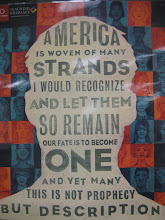"Move It"
“Tolerance does not move us ahead. It maintains the status quo,” Jerome Harste (2007) writes in his Thought Piece for chapter seven of our text. I disagree. To say that tolerance maintains the status quo is to assume that there currently is tolerance, that our society, a society filled with difference, is able to coexist peacefully. True statement? If it were, you would not know the names Rodney King or Matthew Shepherd; you wouldn’t have heard about “the Jena six,” and Mel Gibson wouldn’t have had to apologize for making despicable anti-Semitic comments. America, a land of the tolerant? Hardly.
Nevertheless, one of the first thoughts I had when reading Harste’s comment was, Oh, no! I love the Teaching Tolerance website! Have they got it all wrong? But then I mentally catalogued some of the articles I’ve read on that website and the myriad lesson plans I’ve adapted for my own classroom. Most recently I read an impassioned article taking issue with Columbus Day, its central question asking, “Is Monday’s holiday a celebration of discovery or genocide?” Further, some of the website’s lesson plans have titles including “Conflict Resolution & Peace” and “The ABCs of ‘We the People,’” and one of the annual events Teaching Tolerance promotes in schools is Mix it Up at Lunch Day, a day each year in November where students are encouraged to break the cafeteria’s careful boundaries and sit among peers with whom they don’t normally socialize. I wonder: Would Harste argue that each of these activities simply “maintains the status quo?” Is not tolerance an essential strand in the cord of critical literacy?
To maintain the status quo is to support intolerance, and if we hope to guide our students in reframing their positions in society, we must start with the understanding that, for some of them, reframing will mean getting their hands out of the proverbial cookie jar. This is a tough but necessary step, for how can we promote social action if any student believes another doesn’t deserve empowerment? How impacting will an investigation into, say, educational inequity be for my students who seriously don’t see any problem with their privilege? Who have no qualms about making disparaging comments to those who are not like they are? Who fight each other in the hallways because of difference in immigration status? Now, in all fairness, I must ask: Is tolerance all it takes to “move us ahead”? No. But can we drive across town without putting the key in the ignition? Again: no. Without tolerance, we’re not going anywhere.
Lewison, M., Leland, C. Harste, J.C. (2008). Creating critical classrooms: K-8 reading and writing with an edge. New York: Lawrence Erlbaum Associates.

No comments:
Post a Comment